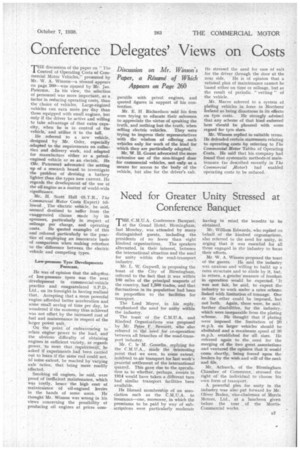Conference Delegates' Views on Costs
Page 41

If you've noticed an error in this article please click here to report it so we can fix it.
Discussion on Mr. Winson's Paper, a Resume of Which Appears on Page 260
'THE discussion of the paper on " Thf
Control of Operating Costs of Commercial Motor Vehicles," presented by Mr. W. A. Winson—a resume appears on page 260—was opened by Mr. Jas. Paterson. In his view, the selection of personnel was more important, as a factor in reducing operating costs, than the choice of vehicles. Large-efigined vehicles can earn more per day than those equipped with small engines, but only if the driver be active and willing to take advantage of that extra capacity, when he is in control of the vehicle, and utilize it to the full.
He referred to a new vehicle. designed by Mr. Osier. especially adapted -to the requirements on collection and delivery work, and adapted for manufacture either as a petrolengined vehicle or as an electric. He (Mr. Paterson) advocated the setting up of a research board to investigate the problem of devising a battery lighter than the types now current. He regards the development of the use of the oil engine as a matter of world-wide significance.
Mr. H. Scott Hall (S.T.R., The Commercial Motor Costs Expert) followed., The electric vehicle, he said, seemed destined to Suffer from the exaggerated claims made by its sponsors, particularly in respect of mileage per charge, and operating costs. He quoted examples of this and referred particularly to the practice of employing an inaccurate basis of comparison when making referelnce to the difference between the electric vehicle and competing types.
Low-pressure Tyre Developments Forecast.
He was of opinion that the adoption. of low-pressure tyres was the next development in commercial-vehicle practice and congratulated S.P.D. Ltd., on its foresight in having realized that. Accepting that a more powerful engine afforded better acceleration and some small saving of time per day, be wondered if the economy thus achieved was not offset by the increased cost of fuel and maintenance in respect of the larger power unit.
On the pointof endeavouring to relate engine power to the load, and the obvious difficulty of obtaining engines in sufficient variety, as regards power, to meet that requireinent: he asked if experiments had been carried out to learn if the same end could not, td some extent, be reached by varying axle ratios, that being more readily effected.
Smoking oil engines, he said, were proof of inefficient maintenance, which was costly, hence the high cost of • maintenance of oil-engined lorries in the hands of some users. He thought Mr. Willson was wrong in his views concerning the possibility ot producing oil engines at prices coin parable with petrol engines, and quoted figures in support of his contention.
Mr. E. H Richardson said his firm were trying to educate their salesmen to appreciate the virtue of speaking the truth, and nothing but the truth, when selling electric vehicles. They were trying to impress their representatives with the wisdom of offering such vehicles only for work of the kind for which they are particularly adapted.
Mr. W. H. Gaunt advocated the more extensive use of the non-hinged door for commercial vehicles, not only as a means for access to the body of the vehicle, but also for the driver's cab.
He stressed the need for ease of exit for the driver through the door at the near side. He is of opinion that a rational plan of maintenance cannot be based either on time or mileage, but as the result of periodic " vetting" of the vehicle.
Mr. Macve referred to a system of plating vehicles in force in Northern Ireland as being disastrous in its effects on tyre costs. He strongly advised that any scheme of that kind enforced here should be planned with some regard for tyre sizes.
Mr. Winson replied in suitable terms. He defended certain statements relating to operating costs by referring to The Commercial Motor Tables of Operating Costs. He said that his company had found that systematic methods of maintenance (as described recently in The Commercial Not or) had enabled operating costs to be reduced.




















































































